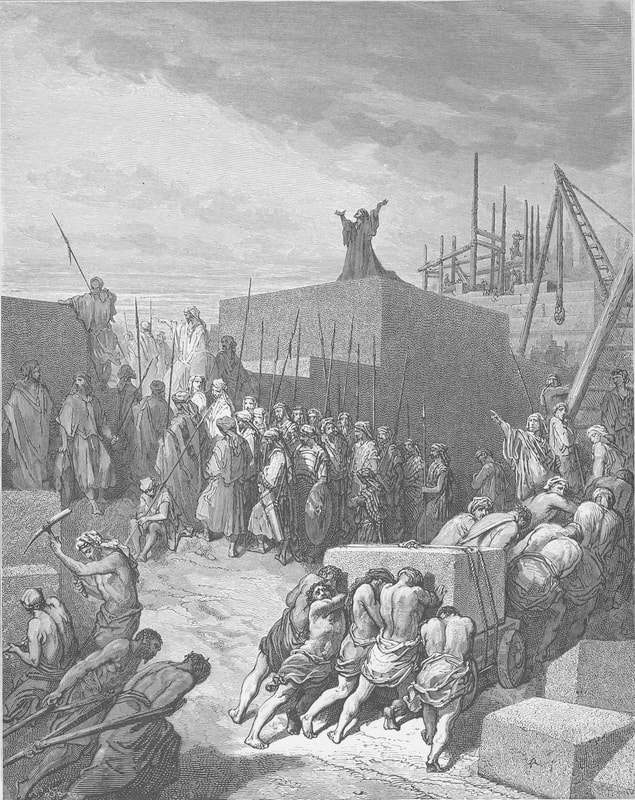The Anglican Way is LiturgicalAs we noted last time, Anglican liturgy is catechetical, taking seriously the idea that how we worship affects what we believe. However, we didn’t really explain what liturgy is or why it’s important to us. That’s the purpose of this note—we also love the Anglican way because of its liturgy. Worship is the recognition and proper appreciation of God’s worthiness. But, it’s much more than that—it is a communal action involving a gathering of people and the presence of Christ Himself. When we worship God, we give Him glory. We do this by praising, thanking, petitioning, learning from, obeying, and proclaiming Him. But what should worship look like? Are we free to just make it up as we go? The Anglican answer is NO! Our Lord prayed for His will to be done on earth “as it is in heaven”. Thankfully, God has given us pictures of heavenly worship, in, among other places, Isaiah and Revelation. These pictures inform as to the postures and language we should use when we worship.
The word liturgy comes from Greek and means “the work of the people.” Therefore, the work we do to worship God is our liturgy. God’s people from the earliest days worshipped in a prescribed structure, at God’s command. The Old Testament includes commands on when and where to worship, clothing during worship, the décor of the place of worship, how worship is to be conducted, and by whom it should be conducted. Why would God command a certain way to worship? Why not allow people to worship God in a way that seems fitting to them? God does not just demand any type of worship; as a perfect, holy being, he demands a holy worship, which gives God the “glory due his Name.” Psalm 29:2. The people of God give Him the honor due unto his Name by worshipping Him in a fitting way. If we trace a line from the Old Testament to Revelation, several principles consistently govern the worship of God. In the Old Testament, God prescribed a calendar to celebrate His acts of redemption (e.g. Passover, Pentecost). He instituted numerous ceremonies to be performed by the people and the priests (e.g. sacrifices and offerings). He ordained certain clothing to be worn in worship. He wrote a hymnal to be used in worship (Psalms). And, worship was to be reverent and ordered. When we look at heavenly worship, we see liturgical worship also. In places like Revelation 4, we see repetitive praises that continue endlessly. This worship is not spontaneous. It is also antiphonal—God speaks to worshippers and they speak back to Him. We see specific postures for worship—bowing, in particular, is used frequently in Revelation. Incense is used in heavenly worship, as it was in Old Testament worship. Like the Old Testament, specific vestments are worn in Revelation (white robes). In sum, heavenly worship includes hymns, repeated prayers/praises, incense, bowing, and vestments. What about New Testament worship though? Doesn’t that free us from all this Old Testament ceremony? The problem with this question is that it doesn’t deal with heavenly worship, which is the ultimate model, as Hebrews 9:24 makes clear. In any event, New Testament worship was formed out of Jewish worship, and history tells us that many of the liturgical elements of Judaism were retained. Acts reflects this continuity. For instance, Christians prayed set prayers (“the prayers” of Acts 2:42) in the temple at specific times (Acts 10:2-3). The early church celebrated certain Jewish holidays, keeping in view their completion in Christ. (Acts 20:6, 1 Corinthians 16:8). They worshiped on Sundays (a set day) and included the “breaking of bread” or communion at every service. (Acts 2:42, 20:7). We also see in the New Testament creedal formulas (1 Cor. 8:6, 15:3-5), doxologies and benedictions (Jude 24-25), and sacramental liturgical formulas (Matt. 28:19, 1 Cor. 11:23-26). [1] These principles made their way into the earliest liturgies of the church. Anglican liturgy is rooted in the liturgy used in Ephesus, believed to have been written by St. John or St. Paul. Indeed, many of the elements of Anglican liturgy are found in the Apostolic Tradition, which is believed to have been written by Hippolytus in the 200s A.D. Anglicanism retained these liturgical principles because, as the Prayer Book says, “the wilful and contemptuous transgression and breaking of a common order and discipline is no small offence before God, Let all things be done among you, saith Saint Paul, in a seemly and due order. . . therefore no man ought to take in hand, nor presume to appoint or alter any publick or common Order in Christ’s Church, except he be lawfully called and authorized thereunto.” God has given us principles of worship and poured His Spirit into the Church to determine how that is worked out. Of note, Christian worship has never, historically, been intended to look like the world's way of gathering, and as such, Anglican worship, done correctly, will not look that way either. In sum, we love the Anglican way because it has faithfully retained liturgical principles found in Scripture and used by the Church throughout the ages. Anglicans see the thread that began in the Old Testament and that ultimately manifests in heaven. We assume that if God wanted us to worship differently in this age, He would have told us so. And, we trust that the Holy Spirit, promised to guide the Church into all truth, did just that in connection with how we worship. [1] Much of this content is found in the blog article “The Biblical Foundations for Liturgical Worship,” by Rev. Jordan Cooper, found here: https://www.patheos.com/blogs/justandsinner/the-biblical-foundations-for-liturgical-worship/?fbclid=IwAR2Je2g_ptZxJCEHypNWnnptAbwnazNeo4hLwlkm9yezeKnNUM22RbsUMlY
0 Comments
Your comment will be posted after it is approved.
Leave a Reply. |
|

